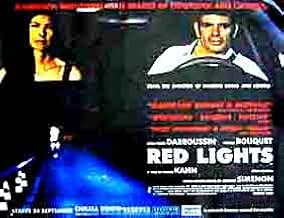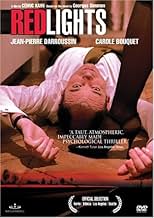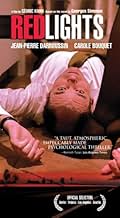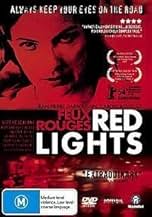AVALIAÇÃO DA IMDb
6,6/10
3,2 mil
SUA AVALIAÇÃO
Adicionar um enredo no seu idiomaA cross-country trip turns out to be a nightmare for a troubled couple.A cross-country trip turns out to be a nightmare for a troubled couple.A cross-country trip turns out to be a nightmare for a troubled couple.
- Direção
- Roteiristas
- Artistas
- Prêmios
- 2 indicações no total
Avaliações em destaque
Opens with brilliantly shot sequences and if it then moves into more traditional French bourgeoisie territory it does it with passion and intelligence. As the narrative unfolds, involving a car drive that begins tetchy and proceeds to become really scary, we identify with the main protagonists and are as concerned as the male lead when the other disappears. A lot of the first part of the film is shot through the front screen of the car but this is so well done with the accompanying dialogue, developing tragedy and suspense we are almost on the edge of our seats. We lurch into nightmare territory and things become almost unbearable as we struggle to assure ourselves as to what is really happening. I was not as interested as the director in the relationship between the high flying wife and the husband who sees himself as her poodle and presumably this is why I found the ending simplistic and verging on the insulting, but never mind a good ride up to then!
Director Cedric Kahn's "Red Lights" alternates between bright day and scary night. Antoine Dunand (Jean-Pierre Darrousin) is an insurance company employee who may enjoy a decent salary but he feels outclassed, and is out-earned I'm sure, by his corporate attorney spouse, Helene (Carole Bouquet). They have a nice, urban apartment and two young kids, a boy and a girl, both at camp eagerly awaiting pickup by their parents.
Antoine feels neglected by Helene, actually hated, and he even half-suspects her time with fellow male employees goes beyond business. He consoles himself with beer and scotch, preferably one after the other. He's clearly becoming, if he isn't already, an alcoholic.
The two leave to pick up their children from a distant camp. It's holiday-making time in France and the highways are jammed. An impatient Antoine, infuriated by the crawl, takes two successive detours, one off the main highway, the other for several refuelings at on-the-way bars. His driving becomes increasingly erratic, his wife's complaints more provocative. Eventually she realizes he's not just driving poorly, he's getting progressively more smashed. An argument ensues interrupting the classical music on their radio. Her anger at his driving is a coda for their growing estrangement. And then a bulletin announces a dangerous criminal has broken prison and is on the loose.
Recognizing that Antoine is really loaded and he won't yield the car keys, Helene runs off while her husband is knocking down scotch, leaving a note that she'll take a train.
Antoine is excessively upset at finding Helene missing-though befogged by booze, he also probably recognizes his own weirdness. Setting off to intercept her train he accepts a morosely quiet hitchhiker (Vincent Deniard), a fellow who offers no name but guess who he really is (hint above).
The film now enters a dark and isolated countryside where Antoine, despite his towering blood alcohol level, becomes justifiably afraid of his mostly silent young passenger.
The ride becomes a trip to terror for Antoine who sobers up enough to know he better master a deteriorating and life-threatening situation. Having done that he hunts for his wife. To tell more would be to spoil an original, well-acted story about fairly ordinary people who have let their marriage grow stale for all the usually mundane reasons that presage a relationship crisis.
The three main characters make "Red Lights," a title that superficially is about Antoine's reckless disregard of traffic signals but actually spotlights the warnings we receive and often ignore about impending personal crises, work. Largely unknown outside of French cinema, all three well-experienced and effective lead actors keep the viewer glued to the screen.
Compared to the current star vehicle hit, "Collateral," "Red Lights" carries forward true, outstanding noir drama by focusing on the straying from safe paths of ordinary people in common situations.
9/10
Antoine feels neglected by Helene, actually hated, and he even half-suspects her time with fellow male employees goes beyond business. He consoles himself with beer and scotch, preferably one after the other. He's clearly becoming, if he isn't already, an alcoholic.
The two leave to pick up their children from a distant camp. It's holiday-making time in France and the highways are jammed. An impatient Antoine, infuriated by the crawl, takes two successive detours, one off the main highway, the other for several refuelings at on-the-way bars. His driving becomes increasingly erratic, his wife's complaints more provocative. Eventually she realizes he's not just driving poorly, he's getting progressively more smashed. An argument ensues interrupting the classical music on their radio. Her anger at his driving is a coda for their growing estrangement. And then a bulletin announces a dangerous criminal has broken prison and is on the loose.
Recognizing that Antoine is really loaded and he won't yield the car keys, Helene runs off while her husband is knocking down scotch, leaving a note that she'll take a train.
Antoine is excessively upset at finding Helene missing-though befogged by booze, he also probably recognizes his own weirdness. Setting off to intercept her train he accepts a morosely quiet hitchhiker (Vincent Deniard), a fellow who offers no name but guess who he really is (hint above).
The film now enters a dark and isolated countryside where Antoine, despite his towering blood alcohol level, becomes justifiably afraid of his mostly silent young passenger.
The ride becomes a trip to terror for Antoine who sobers up enough to know he better master a deteriorating and life-threatening situation. Having done that he hunts for his wife. To tell more would be to spoil an original, well-acted story about fairly ordinary people who have let their marriage grow stale for all the usually mundane reasons that presage a relationship crisis.
The three main characters make "Red Lights," a title that superficially is about Antoine's reckless disregard of traffic signals but actually spotlights the warnings we receive and often ignore about impending personal crises, work. Largely unknown outside of French cinema, all three well-experienced and effective lead actors keep the viewer glued to the screen.
Compared to the current star vehicle hit, "Collateral," "Red Lights" carries forward true, outstanding noir drama by focusing on the straying from safe paths of ordinary people in common situations.
9/10
A decent but ultimately disappointing thriller. It feels like slow-moving imitation Clouzot, with elements from Les Diaboliques ("What really happened?"), The Wages of Fear (high tension on a long drive), and Quai des Orfevres (a similar plot point I don't want to reveal here).
With tighter editing, "Feux rouges" could have been a much stronger movie. It does contain a number of memorable scenes, especially those involving the protagonist and his second passenger. Not a bad film at all, but it doesn't deserve the rave reviews it has drawn from several major critics.
7/10
With tighter editing, "Feux rouges" could have been a much stronger movie. It does contain a number of memorable scenes, especially those involving the protagonist and his second passenger. Not a bad film at all, but it doesn't deserve the rave reviews it has drawn from several major critics.
7/10
After "L'ennui", this was the second Cédric-Kahn-movie I have seen, and I found it great. Kahn proves himself a specialist on ridiculous men lacking self-confidence and absolutely inapt to retain some dignity in a modern world like this.
The thriller plot, as stated by some earlier commentators, may be a little weak, especially as regards the "man on the run" (he is obviously taken directly from the Simenon novel but his character is neither fish nor foul). But this is not what it is all about. The thriller plot is merely an excuse to give a touching and disturbing portrayal of character Antoine (and his marriage).
Let me answer to two of the "plot holes" discovered by two other commentators: Antoine's drinking does make sense; he drinks because of frustration and a minority complex for not feeling man enough in the presence of his successful wife. His drinking is a childish act of defiance, he is not a sensible grown-up, not a man (as he keeps repeating himself). And of course, he doesn't recall all these telephone numbers from his memory; as indicated with one of the first calls, he calls directory inquiries and has himself connected to the respective partner each time (remember, there is cuts between the various calls).
Red Lights is a brilliant character study concealed as a masterpiece of suspense. Darroussin gives a touching performance in his role as hero and anti-hero at the same time. He is not particularly likable but still makes us feel sorry for him.
The ending, which I am not going to reveal here, is stirring in a very subtle way because above all it raises the question how it is all going to go on.
I like stories in which weird things happen out of character logic. This is a particular successful one.
The thriller plot, as stated by some earlier commentators, may be a little weak, especially as regards the "man on the run" (he is obviously taken directly from the Simenon novel but his character is neither fish nor foul). But this is not what it is all about. The thriller plot is merely an excuse to give a touching and disturbing portrayal of character Antoine (and his marriage).
Let me answer to two of the "plot holes" discovered by two other commentators: Antoine's drinking does make sense; he drinks because of frustration and a minority complex for not feeling man enough in the presence of his successful wife. His drinking is a childish act of defiance, he is not a sensible grown-up, not a man (as he keeps repeating himself). And of course, he doesn't recall all these telephone numbers from his memory; as indicated with one of the first calls, he calls directory inquiries and has himself connected to the respective partner each time (remember, there is cuts between the various calls).
Red Lights is a brilliant character study concealed as a masterpiece of suspense. Darroussin gives a touching performance in his role as hero and anti-hero at the same time. He is not particularly likable but still makes us feel sorry for him.
The ending, which I am not going to reveal here, is stirring in a very subtle way because above all it raises the question how it is all going to go on.
I like stories in which weird things happen out of character logic. This is a particular successful one.
The first thing to take note in Red Lights is that the story is not rushed: Antoine (Jean-Pierre Darrousin) is perhaps a passive-aggressive, or maybe just having a mid-life crisis. He and his wife Helene are planning for a trip to pick up the kids from summer camp. But the drive hits some things in the way- he has a beer and a whiskey before leaving; a traffic jam gets to Antoine; he drinks again at a roadside; he and his wife bicker; he drinks again; she leaves, and once he realizes he can't catch up with her, he decides to have a night with a little more drinking ahead. While he says he doesn't drink too often ("two, three times a year", he says), this night is different. Especially with a fugitive somewhere out on the loose, as the radio says.
Cedric Kahn is a skilled and trust-worthy director (via France) for a few reasons in dealing with his latest film Red Lights. He doesn't make the pace in the tenser scenes (with a couple of juicy exceptions) really quick cut like in a choppy Hollywood piece. He brings an interesting blend of visuals with the city and the roads, the cars, then as it grows darker outside, the lights outside become key. When Antoine awakes the next morning on the roadside, he's out in the country. As well, he has a great blend of music from Debusy, whom I may have heard before this film but never recognized. It's a fascinating element to add with the impending doom of the film's story. But the key thing that the director can do for a film is the right casting, and here's it's impeccable in dealing with the three leads. Jean-Pierre Darrousin is terrific at conveying the mind-set of this husband in a rocky relationship. Then in the second and third acts, despite what he's doing on the road, he keeps consistent in keeping as the film's reluctant hero. Credit should also be given to first-time actor Vincent Deniard, who is perfect at being the "quiet one you got to watch". And Carole Bouquet is a fair counterpart to a Darrosin.
Although the denouement starts to drag, for my money the film's main chunk doesn't. It would be one thing if Antoine just got drunk. But there's also a good interest in the talking points with the character, as he decides to blow his mind in the process. Red Lights is definitely an art-house film that won't please everyone (the film ends rather realistically, without the kind of extra bit American audiences might want that's more intimate here), but it's still very compelling.
Cedric Kahn is a skilled and trust-worthy director (via France) for a few reasons in dealing with his latest film Red Lights. He doesn't make the pace in the tenser scenes (with a couple of juicy exceptions) really quick cut like in a choppy Hollywood piece. He brings an interesting blend of visuals with the city and the roads, the cars, then as it grows darker outside, the lights outside become key. When Antoine awakes the next morning on the roadside, he's out in the country. As well, he has a great blend of music from Debusy, whom I may have heard before this film but never recognized. It's a fascinating element to add with the impending doom of the film's story. But the key thing that the director can do for a film is the right casting, and here's it's impeccable in dealing with the three leads. Jean-Pierre Darrousin is terrific at conveying the mind-set of this husband in a rocky relationship. Then in the second and third acts, despite what he's doing on the road, he keeps consistent in keeping as the film's reluctant hero. Credit should also be given to first-time actor Vincent Deniard, who is perfect at being the "quiet one you got to watch". And Carole Bouquet is a fair counterpart to a Darrosin.
Although the denouement starts to drag, for my money the film's main chunk doesn't. It would be one thing if Antoine just got drunk. But there's also a good interest in the talking points with the character, as he decides to blow his mind in the process. Red Lights is definitely an art-house film that won't please everyone (the film ends rather realistically, without the kind of extra bit American audiences might want that's more intimate here), but it's still very compelling.
Você sabia?
- Erros de gravaçãoAt the beginning of the movie, the main characters meet at a cafe in the late afternoon. They then go home and get ready to travel to Bordeaux to pick up their kids. On the trip to Bordeaux, they are stuck in heavy traffic. Although it is now early evening, the vertical shadows cast by the cars indicate that the traffic scenes were shot at mid-day.
- ConexõesEdited into Le documentaire culturel: Le siècle de Simenon (2014)
- Trilhas sonorasNuages
from "Nocturnes"
Written by Claude Debussy
Performed by Etienne Baudo and LOrchestre de l'Opéra national de Paris
Conducted by Manuel Rosenthal
Principais escolhas
Faça login para avaliar e ver a lista de recomendações personalizadas
- How long is Red Lights?Fornecido pela Alexa
Detalhes
- Data de lançamento
- País de origem
- Central de atendimento oficial
- Idiomas
- Também conhecido como
- Red Lights
- Locações de filme
- Cléré les Pins, França(The garage where Antoine has his tyre changed.)
- Empresas de produção
- Consulte mais créditos da empresa na IMDbPro
Bilheteria
- Faturamento bruto nos EUA e Canadá
- US$ 673.828
- Fim de semana de estreia nos EUA e Canadá
- US$ 3.202
- 22 de ago. de 2004
- Faturamento bruto mundial
- US$ 2.394.429
- Tempo de duração
- 1 h 45 min(105 min)
- Cor
- Mixagem de som
- Proporção
- 1.85 : 1
Contribua para esta página
Sugerir uma alteração ou adicionar conteúdo ausente






















